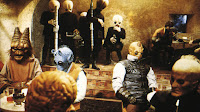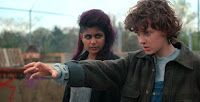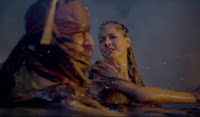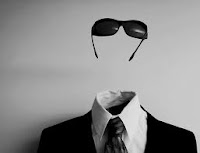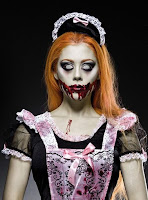So, one thing I’ve mentioned here once or thrice is the idea of believability. On some level, we need to accept this character or world as real, because that’s how their stories become real to us. If a character or a world asks us to accept too much… well, we just can’t. One too many coincidences or secret cults or hidden talents and… we’re out. That willing suspension of disbelief gets shattered.
Of course, what’s “believable” is kind of tricky, isn’t it? I mean, we completely accept a tavern with fifty different alien races in it when we’re watching a Star Wars movie. But if I’m reading the latest addition to the Their Bright Ascendancy trilogy, well… that doesn’t work quite as well. And if this was an episode of Elementaryor even iZombie we’d just roll our eyes and talk about the days back when this was a good show.
When we start to get invested in a story, part of it is that we get a good feel for what kind of world this story is set in. Does magic exist? Or aliens? Does everyone know about vampires or are they still living quietly in the shadows, unknown to the average person? Assuming they’re even real.
I was reading a book lately that was set in Victorian London (locations, names, and/or supernatural beings may have been changed to protect the relatively innocent). A take on “the great detective” trope, but it was fun and had a nice mystery aspect to it (hunting a Jack the Ripper-esque serial killer) and the dialogue and descriptions of
A little more than halfway through the book, maybe close to 60 or 70% in, we find out that the serial killer is actually the Frankenstein Monster, gathering parts for yet another attempt at electro-alchemically creating a mate for himself. It just came out of nowhere Not so much a twist (it wasn’t really set up) as a weird reveal. And it kind of… well, it knocked me out of the story. It was a cool idea, but suddenly this was a very different world than I’d been led to believe. The type of characters who could be in it had drastically shifted. I had to reconsider a lot of things, and one of the biggest was “does this story still make sense? Is this world still believable?”
Needless to say, I had to readjust my expectations as far as where this story sat on the plausibility/believability scale. Which meant I then had to go back and reconsider everything that had already happened. Were all those earlier moment still believable, now that I knew they were happening in this world?
And this isn’t to mean I came to a dead stop and started checking things off in a plus or minus column. It was just one of those moments where an instinctive reaction forces everything up into my brain. I stopped enjoying and started analyzing. I was much more in my head for the rest of the story.
It’s kinda like wandering through a pool on a hot day. You may be really enjoying the cool water, the feeling of being outside, being with friends, all of it. It might feel fantastic. But then you hit a spot of water that’s just a little warmer—just that certain amountwarmer—and now that one small-but-significant change has made you very aware of the pool. Who else is in the pool. Where are they? Where were they? Now you’re not so sure if the pool’s a great place anymore. Sure, it may be nothing, but it’s kinda in your head now, how much water is on your skin.
And that’s a small change. Imagine if you bumped up against a dead rat in the pool. Or a shark. How the hell is there a shark in the pool? Was it there all long? Was it invited to this party, too? Is it responsible for the warm spot?
We need to feel comfortable in the world of the story. I don’t want my readers to feel confused or betrayed. Bruce Joel Rubin made a wonderful observation years back that we experience stories in our gut, but we analyze them in our head. So the moment we go into our head, trying to figure out what’s up with that warm spot, we start to lose our readers.
If I had to put a loose rule to it, I think any serious world-change like this has to be the end of act one/start of act two moment. It’s part of the easing-in process. The Matrix. Red Rising. Harry Potter. In all of these stories, the discovery that the world was than what we’d first been led to believe comes fairly early. It’s probably notable that it’s also what gets all these stories really going. This discovery is, arguably, the inciting incident, as folks have been known to call it.
Now, this moment can come later, sure. I’m betting everybody reading this knows at least three or four “We were on Earth all along” stories. But when these stories work—and that’s kind of a rare thing if you think about it—it’s because this is a very carefully set up twist. And like any good twist, it’s been set up so the big reveal makes things fall perfectly into place rather than scatter across the table and spill onto the floor.
I’d also add that just because we’re flexing that suspension of disbelief with one thing doesn’t mean another thing will slide off with no problem. Finding out the serial killer we’re chasing is Frankenstein doesn’t mean we’ll also accept that he leads a taskforce of steampunk cyborgs that protect the earth from alien invaders. Just because there are vampires doesn’t mean I’ll buy that Abraham Lincoln really was a vampire hunter sanctioned by the
So if halfway through my story I’m introducing an element that’s going to change how readers look at my world, I should take a good, long look at it. How big of a change is it? Is it very late in the story? Is it coming out of nowhere?

Next time… well, next time is Comic-Con, like I said. I probably won’t have a post up next week, but I may have a few fun cartoons and such if you want to check back in. And then maybe the week after that I’ll blab about cool camera shots.
Until then… go write.


